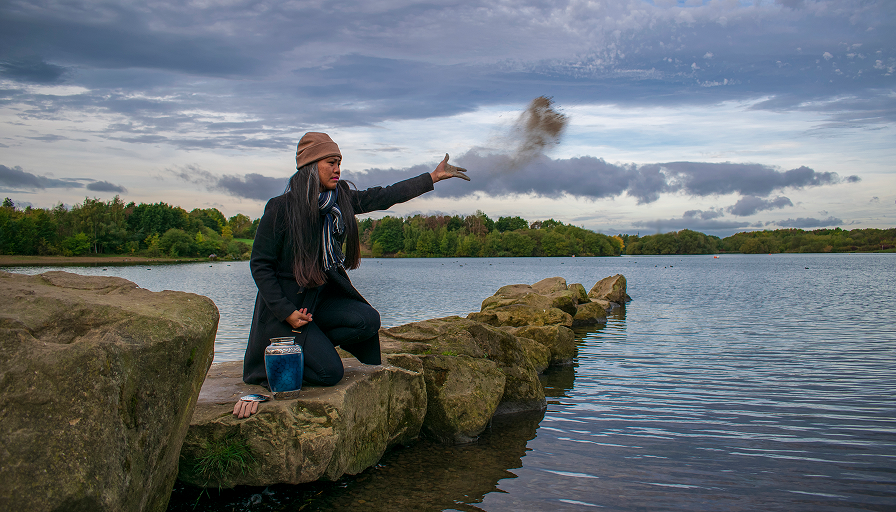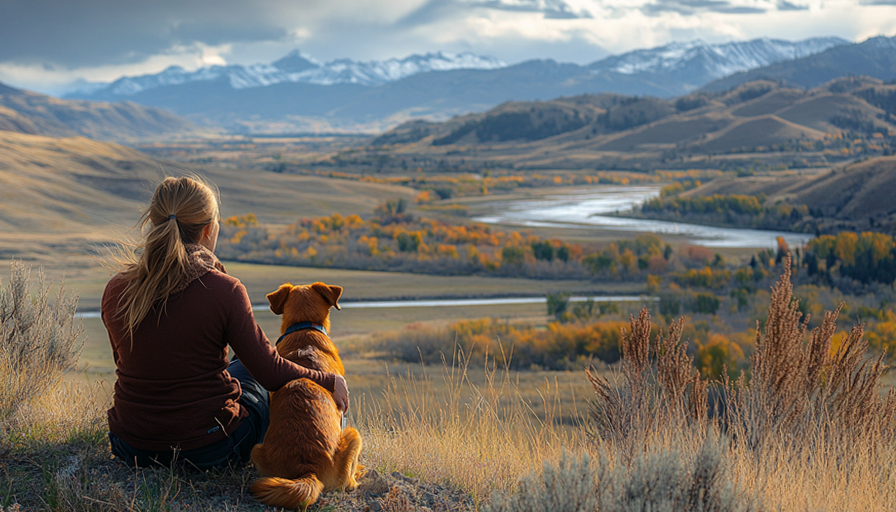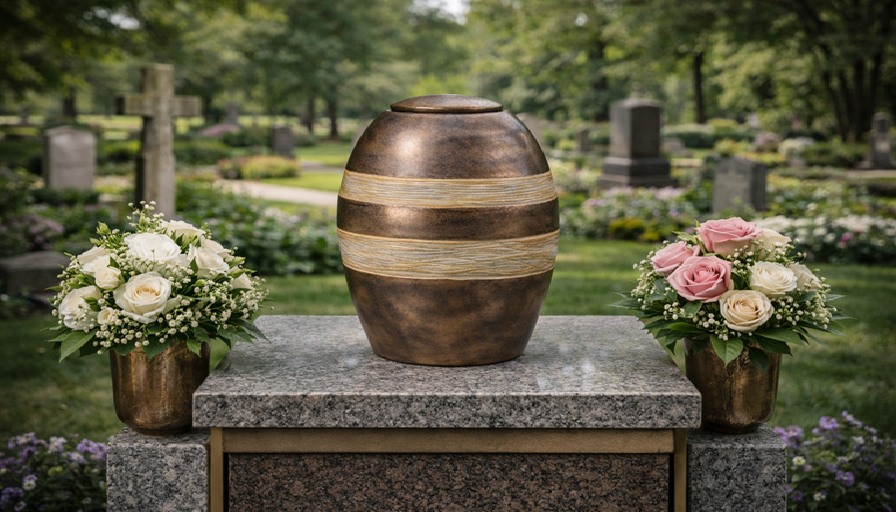When it comes to saying goodbye to a recently deceased loved one, there are many options you have to organise an appropriate and meaningful ceremony. While some people are happy with the idea of their ashes being scattered anywhere, like a park or even the back garden of their family home. Some who have a deep connection to the sea, whether it's because they love the beach or have a maritime heritage, may want their ashes scattered at sea. Even if they have not explicitly requested this, you may decide that it is what they would wish to do if it were your decision. You should also then consider which scattering urn to choose.
This is a common option, and you may already be aware of it, but you may not know how to arrange ashes scattering in the sea ceremony.
If that is the case, or you are just interested in learning more about this practice, the following blog contains as much information as you could hope to find on scattering ashes at sea.
UK Regulations and Laws Regarding Scatting Ashes at Sea
The regulations and laws related to scattering ashes at sea in the UK are relatively lax compared to burials at sea. There are no set-in-stone legal requirements in reference except that you need to get permission before scattering ashes on any land, including bodies of water, which is privately owned. There is no need to seek consent or to obtain a licence to scatter ashes on a beach or in tidal coastal waters. The only legal stipulations set out by the Environmental Agency in situations where the seas you will scatter ashes in are less than 5 miles from the coast. In those situations, the legal instructions are:
- Although the scattered ashes won't harm wildlife or affect water quality, you need to be careful with what you scatter the ashes in or with and ensure that all materials are biodegradable. For example, personal items and wreaths containing metallic components or plastic parts create litter, harm wildlife, and contaminate water.
- Scatter the ashes in an area far from where fish or people swim and away from buildings.
- Scatter the ashes as close as possible to the surface of the water. Avoid scattering the ashes on windy days so they are not blown too far and potentially into people who may be living or working close to the water.
Scattering Ashes at Sea – How to Do it?
If you choose to scatter ashes at sea, there are some essential things you need to consider. It would be best to consider whether you will spread the ashes from a shoreline or boat.
Scattering Ashes from Shoreline
Benefits of scattering ashes from the shoreline include:
- The issue of weather will not be as much of a problem
- You can choose the time and duration of the scattering ashes ceremony
- There is no chance anyone will suffer from or experience seasickness
- There are no additional costs
Scattering Ashes Ceremony from a Boat
Benefits of scattering ashes from a boat include:
- It is easy to scatter the ashes this way
- As you will be surrounded by the sea, it can make the ceremony feel more significant
- It is easier to scatter ashes in more inaccessible places
- There is more privacy than at shore or on a beach
When you are sea and scattering ashes, you have the option to toss them into the wind, which can be a significant and emotional way to send off your deceased loved one. However, it would be best if you kept in mind the direction of the wind so that the ashes don't blow back into your face or the face of those on the boat with you. Another option at sea is to use a water urn to scatter the ashes. You can then watch as the ashes float away, and the urn will eventually break down without causing harm to the sea or the sea life that may be living in it.
We have put together a handy list of tips to help you avoid potential mistakes and mishaps when scattering ashes at sea.
- Always familiarise yourself with the local laws and regulations
- Choose biodegradable materials for urns and other items related to the ceremony
- Be mindful of the weather conditions
- Ensure you are upwind and scatter the ashes following the direction of the wind rather than against it to avoid covering yourself, your guests, or the boat in them.
- Be sure to have water or wet wipes available when you scatter them. Cremated ashes stick to the skin if they come into contact with it.
- Ideally, the summer months are best, as they are much calmer, and the conditions are less likely to cause anyone seasickness to suffer.
Can Flowers Be Scattered at Sea?
Yes, flowers and flower petals can be scattered at sea. The only rule is that you must use real flowers.
Can Ashes Be Scattered at UK Beaches?
There are no rules or regulations against scattering ashes at the beach. However, some tips and ideas should be considered when planning the ceremony to ensure it goes smoothly.
How to Scatter Ashes at The Beach?
Scattering ashes on the beach is often done by trenching. As you may have guessed, trenching involves digging in the sand by making a shallow trench on the beach. People often choose to do this in the shape of something like a heart or to spell out the name of the deceased or a message to them. There are no set-in-stone rules about this, just down to personal preference and taste. Once you have dug out a trench, you can scatter the ashes into that trench. The aim is to create a trench that is as close to the water as possible so that the tide will wash the remains away gradually.
It would be best if you also were mindful of dog walkers and other beach goers. So you should try to arrange for the ceremony to happen at quiet times while consulting the tide timetable for that particular beach so you have the tradition while the tide is out.
You can then watch as the tide gradually washes the ashes out to sea.
Can Ashes Be Scattered Into Rivers?
There is no difference between scattering ashes at sea or the ocean and spreading them at lakes, canals, and rivers. You can do it from a boat, either one you own or hire from a boat company or scatter the ashes from the riverbank. Make sure you do so at a point that is not too slippy to avoid any mishaps or accidents.
There are some other points you should bear in mind if you decide to scatter the ashes at a river, lake, or canal:
- Don't scatter ashes there on windy days to avoid the ashes being blown into the faces of people who may be working or living in the area
- You need to scatter ashes at a spot over a kilometre upstream from any water extraction point. If you have doubts about a body of water or where you want to hold the ashes scattering ceremony, you should contact the Environment Agency office.
- You also need to ensure you scatter the ashes at a spot as far away as possible from where people fish and bathe, marinas and buildings are.
Ideas for the Ceremony
Suppose you decide to have a ceremony to scatter ashes at sea. In that case, you have the unique benefit you don't get with more conventional funerals to think more carefully about how you might want to celebrate the deceased's life. Many people see the scattering of ashes at sea as a return to nature, freedom, and even the cleansing of their souls. Although there are no formal rules or set plans for scattering ashes at sea ceremonies, the following might give you some ideas of what you could do:
- Many people choose to have a scattering at sea ceremony that is small and intimate and for close friends and relatives of the deceased.
- Many have themed ceremonies. Themed ceremonies can be creative and personal and either based on the deceased's desired wishes or something that means something to them and their fellow grieving loved ones. It is not unheard of to have songs, poems, dancing, and laughter at these events.
- Allow time for critical people from the deceased's life to speak about their experiences and relationships with them.
- You can scatter flowers into the water along with the ashes and watch them drift off.
Where Should You Have a Scattering Ashes at Sea Ceremony?
Really, it depends on any wishes expressed by the deceased and your and other family members' desires. As you can imagine, some areas are more popular than others. Consider some of the following destinations for scattering ashes during sea ceremonies.
- The Mary Rose Buoy, outside Portsmouth harbour
- Loch Lomond
- Isle of Man, Irish Sea
- Teignmouth, River Teign
- Great Yarmouth, Norfolk and Suffolk Broads
- Dublin, Ireland, River Liffey
- Jurassic Coast beach, near Weymouth in Dorset
Scattering ashes at sea is a beautiful and unforgettable way to memorialise and celebrate the passing of a loved one. There are limited rules and regulations on doing this, which makes it easier to plan than some other options. Although it may seem a little daunting at first. If you keep the tips and suggestions we have included in this post in mind when you are planning and arranging a scattering at-sea ceremony. We are confident you will be able to host an event that will not only be an appropriate send-off for the deceased. A great way to help with the grieving process of all in attendance.














